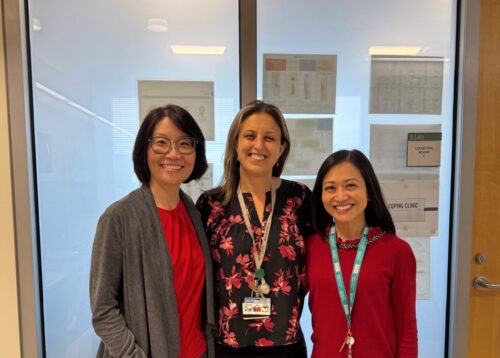New Hotline for PCPs Offers Guidance in Treating Addiction and Chronic Pain
May 20, 2019
By Ray Hainer

Getty Images
For busy primary care providers managing substance use disorders and chronic pain in their clinics, expert help is a phone call away.
Back in 2003, soon after buprenorphine was approved by the Food and Drug Administration for the treatment of opioid use disorder, primary care physician Laura Kehoe, MD, was among the first in her clinic to begin writing prescriptions. She felt passionately that all doctors should play a part in treating people with addiction, and so she’d taken the federally mandated training to receive a waiver to prescribe the medication.
“But I still had this anxiety,” Kehoe recalls. “It was new to me. Was I going to harm my patients? Was I going to help them? Was the DEA going to come and take my license away if I didn’t do everything right?”
As it turned out, the best antidote to her anxiety wasn’t the reading-up she’d done, or what she’d learned in the eight-hour waiver training, or even the coaching she’d received during her residency. It was the real-time conversations she had with a senior mentor who’d begun prescribing buprenorphine ahead of her and helped her navigate questions and decisions as they arose.
“I just needed somebody to walk me through it in the moment,” says Kehoe, who is now the medical director of the Substance Use Disorder Bridge Clinic at Massachusetts General Hospital (MGH) in Boston.
Thanks to a new hotline known as the Massachusetts Consultation Service for Treatment of Addiction and Pain (MCSTAP), that type of in-the-moment guidance is now available to providers across the state who are wrestling with the complexities of managing opioid use disorder (OUD) and chronic pain in primary care. Kehoe is one of 10 physicians with addiction expertise — from institutions including Boston Medical Center (BMC), MGH, and UMass Memorial Medical Center — who staff the lines for MCSTAP (pronounced “McStap”) and talk with providers each weekday from 9 to 5.
Unlike other training and continuing medical education that addresses OUD in broad strokes, MCSTAP’s phone consultations provide concrete, patient-specific advice based on the patient’s medical history, lab tests, and presentation that day, says Christopher Shanahan, MD, the medical director of MCSTAP and the director of the Community Medicine Unit at BMC.
“It’s very hard being a primary care doc. You don’t have any time, and there’s usually eight things going on at once with a patient,” Shanahan says. “If you had all the time in the world you could figure it out, but sometimes you’re kind of stuck. You have a feeling “I should or shouldn’t be doing this, but I’m not sure” and you need to talk to somebody. And that’s where a hotline comes in.”
Building confidence in appropriate opioid and MOUD prescribing
MCSTAP, which launched in January 2019, is funded by the Massachusetts Executive Office of Health and Human Services and was created as part of an expansive new law designed to step up the state’s efforts in fighting the opioid epidemic. The legislation also mandates new restrictions on opioid and benzodiazepine prescribing and greater access to medications for OUD, among many other measures.
The service is ramping up at a time of heightened scrutiny and uncertainty for providers who are managing chronic pain and OUD in their patients. With opioid-related overdose deaths hovering at record highs, physicians have been caught between tighter guidelines for opioid prescribing on the one hand, and on the other, patients with chronic pain who say they rely on opioids to function.

MCSTAP was created under legislation signed into law by Massachusetts Governor Charlie Baker in August 2018. (Courtesy Governor’s Press Office)
A survey and a series of focus groups conducted last fall by the Massachusetts Behavioral Health Partnership, which administers MCSTAP, confirmed that primary care practices are struggling with these competing demands and with the opioid crisis overall. Nearly 10% of the 115 survey respondents indicated they were “very uncomfortable” treating patients with chronic pain, OUD, or both.
Providers expressed a lack of confidence in tapering pain patients off opioids, managing pain through non-pharmaceutical means, initiating medications for OUD, and prescribing for OUD when a mental health diagnosis is also present. In addition, an overwhelming majority of respondents described access to programs that treat chronic pain or OUD and the lack of case management support for patients with those conditions as “significant” challenges.
Nearly 10% of the primary care providers surveyed indicated they were ‘very uncomfortable’ treating patients with chronic pain, OUD, or both.
MCSTAP is intended to fill these gaps. When a provider calls the service, a resource and referral specialist triages the call and hands it off to a physician consultant, who calls the provider back within 30 minutes. The consultant and provider then discuss the case and a tentative treatment plan. If needed, the resource and referral specialist follows up with relevant resources culled from a vetted and curated list maintained by William James College. In some cases, the consultant and provider also schedule a follow-up call.
The majority of the calls Kehoe has fielded to date have involved questions about diagnosing OUD and starting interventions, including medications like buprenorphine. Many of the providers she has spoken with have received the waiver training to prescribe medications for OUD, and are very motivated to help their patients, but still feel overwhelmed at times when faced with a patient in clinic, Kehoe says.
“One of the biggest things we can provide is validation and reassurance to providers, whether they are really new to this, or really seasoned,” she says.
Expanding access to pain and addiction prescribing guidance
MCSTAP can only be as effective as the number of providers it reaches. Shanahan and team have spent the spring promoting the service in meetings and presentations to accountable care organizations, physician groups, and healthcare organizations in Massachusetts. The goal is to make the MCSTAP number (1-833-PAIN-SUD) top of mind for primary care providers across the state.
The MCSTAP team is also developing a clinical manual for their website that will cover a host of topics including screening and assessments, brief interventions for OUD, managing acute and chronic pain, and dual diagnoses.
Although MCSTAP is available only to providers in Massachusetts, states including Arkansas, California, and Maryland have established similar consultation services. The low-tech delivery model and the huge demand for consultations regarding opioids, OUD, and chronic pain means hotlines like MCSTAP are cost-effective and easily scalable, Shanahan says.
“It’s pretty damn simple,” Shanahan says. “You just need some experienced docs who have the expertise and who know how to talk to people in a way that helps them learn.”


